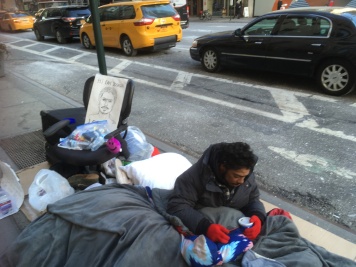As told to Brooke Allen and Janusz Gilewicz at the Tick Tock diner in Manhattan on January 7, 2019
 I was born Josue Febres. I am 40 years old. My life story started in Atlantic City, New Jersey. At fifteen years old I became a provisional boxer, welterweight glove. It was in Paterson where I started boxing.
I was born Josue Febres. I am 40 years old. My life story started in Atlantic City, New Jersey. At fifteen years old I became a provisional boxer, welterweight glove. It was in Paterson where I started boxing.
At 27 years old I had a car accident. In one of my legs and one of my arms I have metal in it so definitely my career was over. From Atlantic City we moved to New York.
Unfortunately I caught cancer in my lungs from smoking cigarettes and I got HIV from messing with a woman.
I became homeless about three months ago because I lost my mother, my wife and my daughter who got burned in a fire in my apartment. I was sleeping and it was a Saturday night and I fell asleep with a cigarette in my hand. I did what I wasn’t supposed to be doing; sleeping with a cigarette lit in an hand with kids around.
So, unfortunately the house caught on fire. I tried saving my wife and my daughters and my mamma was already telling me to take them out. My mamma was 69 years old so she didn’t care about herself, only about me taking my wife and my baby out. You know how a grandmother is. If a mother is crazy, imagine a grandmother. My baby was an only grandchild she got from her youngest son; the youngest one in the family.
Things went crazy; I almost killed myself, committed suicide twice. I’ve been homeless for maybe three months, no more than that. Life is hard. I sit down sometimes in a corner and I think about what is going on with my life. Who is going to handle my life; who is going to come and rescue me; who is going to help me?
When I was in the hospital they give me what I’m supposed to have. My medications, my psychiatrist; my history. They gave me everything to get back to my life.
But they tell me I can’t have a job because… it can’t be; it can’t be, because of HIV. HIV kills everything.
They don’t want me around nobody because they’re scared; they’re scared. I’m scared too because I’m sick and I don’t want to get nobody sick and I don’t want nobody to think about that. Because I’m sick they are going to get sick. But you cannot catch HIV like that; that easy. HIV has got to be blood transfusion. If not, you’ll never catch it. Same thing happen with Hepatitis-C. I don’t got it, but it’s the same way.
Cancer? I can’t say anything ‘cause it runs in the family. Also, with smoking so. Asthma? I was born an asthmatic as a baby. Diabetes I got; after 25 or 30 years old is when I found out I was a diabetic.
Other than that, I’m happy because I’m still alive.
 My friend, Janusz, is an artist who I commissioned to paint a portrait for me. We agreed to meet the Tick Tock at 10 A. M. on January 7th, 2019. I arrived early so I struck up a conversation with Joshua, who lives on the grate in front of the restaurant.
My friend, Janusz, is an artist who I commissioned to paint a portrait for me. We agreed to meet the Tick Tock at 10 A. M. on January 7th, 2019. I arrived early so I struck up a conversation with Joshua, who lives on the grate in front of the restaurant.
Because Joshua seemed hungry I invited him to have breakfast with us. His story was fascinating so he agreed to let us record it on my phone and then Janusz sketched a sign for him.
Stop by and visit him to learn more. If you hurry up I’m pretty sure he’ll be there on the northwest corner of 34th and 8th. I know he was there Sunday morning, the 13th, when I took this second picture. He gave me $3 and asked me to buy him a coffee with seven sugars.
Just like him, you might want to tell your story to somebody too. If the people who love you are too busy to listen, you might want to stop by and visit with Joshua. He has time, for now at least.
Listen to his story in his own words.
He has more to say about his life and about his hopes and aspirations on the audio. He says he is a pretty funny guy (which I can confirm) and he can rap in both English and Spanish.

 A Luftwaffe Airman’s Daughter
A Luftwaffe Airman’s Daughter



 As an undergraduate I went on a date to see a famous “mentalist”. I find magicians entertaining. My date was eager to show me proof of the supernatural. I was entertained and she found her evidence.
As an undergraduate I went on a date to see a famous “mentalist”. I find magicians entertaining. My date was eager to show me proof of the supernatural. I was entertained and she found her evidence.
 My Grandma Anne was a southern belle born and raised in Dallas. Granddad Tom was raised in Chicago and sent from home at 14 to earn has way as a man. They met in New York City.
My Grandma Anne was a southern belle born and raised in Dallas. Granddad Tom was raised in Chicago and sent from home at 14 to earn has way as a man. They met in New York City.